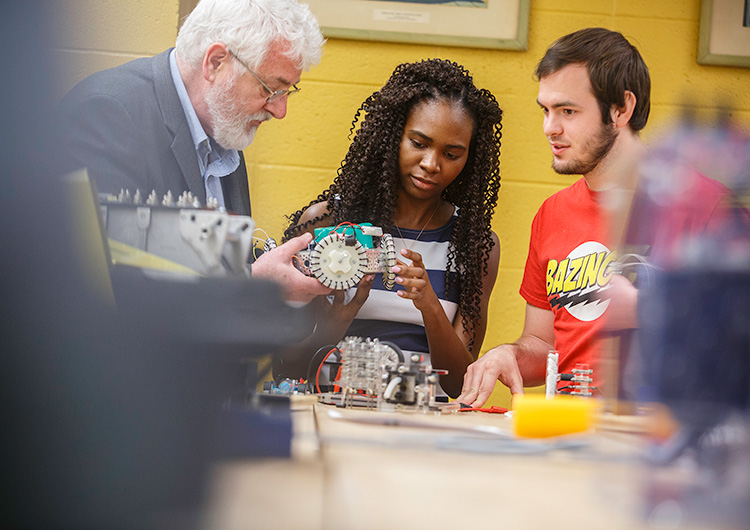Bachelor's Degree in Electrical Engineering
Degree: Bachelor of Science
Major: Electrical Engineering
Hours: 120

Electrical Engineering Overview
The Lamar University Bachelor of Science in Electrical Engineering focuses on technological innovation, shaping the future across industries in various fields that include electrical and electronic devices and circuits, communication systems, control and instrumentation, power systems, renewable energy, etc. Students can also double major in Electrical Engineering and Computer Engineering in five years by taking only 31 extra credit hours.
The Phillip M. Drayer Department of Electrical Engineering is committed to providing a rigorous education grounded in both theoretical foundations and practical applications. You will have opportunities to collaborate with distinguished faculty, engage in cutting-edge research and develop skills that will prepare you to become leaders and innovators in the field of electrical engineering.
This ABET-accredited program offers a flexible schedule that meets the needs of traditional, non-traditional, full-time working and intern/co-op students. All required electrical and computer engineering courses are offered in two sections: on-campus and online, which are taught simultaneously. All technical elective courses are offered online. We encourage you to take advantage of the resources, mentorship and collaborative environment offered.
Electrical Engineering Courses You May Take
Introduction to ECE: This course introduces various topics in electrical and computer engineering. Technical topics include analog and digital systems. Technical skills include hands-on, design thinking, problem-solving and computer-aided design.
Signals, Systems and Transforms: High-level representation of systems in both continuous and discrete time domains; properties of systems; description of continuous and discrete signals and their properties; zero-pole representations; Laplace and Fourier-based analyses; the concept of sampling and the sampling theorem.
Electrical Analysis: Application of the digital computer to analysis and design of electrical systems using numerical methods and commercial software such as MATLAB.
Electromagnetics: Vector analysis, coordinate systems, static and quasi-static electric fields, electric potential and dielectric forces. Maxwell's Equations, plane waves, transmission lines, matching networks and Smith chart analysis.
Electronics I: Topics include basic physics and operation of semiconductor electronic devices, analysis and design of electronic circuits including diodes, BJT, MOSFET and JFET transistors and their applications; and operational amplifier concepts, circuits analysis and design and applications.
Career Paths for Electrical Engineering
Electrical engineers design, build, control, maintain, protect and optimize the performance of the electrical systems and devices. Electrical engineering is a broad field that encompasses various sub-disciplines, and electrical engineers work with a wide range of technologies.
The key aspects of the role of an electrical engineer include power generation and transmission, electronic devices and circuits, control and instrumentation, communication systems and devices, green abd renewable energy, smart and electric cars and signal processing. Electrical engineers work in various industries.
Primary Careers
Electrical engineer, power engineer, control engineer, communication engineer, instrumentation engineer, RF and microwave engineer
- Power and energy
- Digital and analog electronics
- Telecommunications
- Artificial intelligence
- Control and robotics
- Cybersecurity
- Computer technology companies
- Technology and electronics manufacturers
- Household appliances distributors
- Power and energy plants
- Government agencies
- Healthcare
